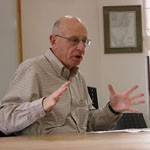By Ira Sharkansky

JERUSALEM — There’s a new government, but . . .
As we got closer to the Knesset decision on a new government, the tone of Bibi and his supporters became ever more aggressive. And disturbing. Commentators compared it to the actions of Donald Trump.
Trump didn’t attend the ceremonial signing in of the Biden administration.
Will Bibi avoid the start of the new government?
We’re hearing that it will go smoothly.
So far, no conversations between Bibi Netanyahu and his successor. What’ll happen in the turnover? When will the new people learn what’s been happening in the various offices?
Was the election stolen? Was it the worst example of corrupt politics in Israel’s history? Or the history of democratic governments?
According to Bibi and his supporters, it was all of that.
To be sure, it was possible to find Naftali Bennett, Gideon Sa’ar, Yair Lapid, and others saying things in the past that contrast with their present alignment. And to find comments of Bibi in the past that contrast with his recent actions and pronouncements. Politics is like that. Especially, perhaps, when the electorate is closely divided. Politicians change what they say and how they behave. They have to, in order to create alliances and move with the tide of opportunity.
Bennett said he wouldn’t align with Lapid. He said he wanted a right wing government. He also said that he opposed yet another election.
Apparently, he talked with Bibi, but couldn’t reach an agreement. And Lapid offered him the first turn at a rotating Prime Minister’s post. Most of his party’s Knesset Members moved with him, and supported the new government. Yet he reached the Prime Minister’s Office with six or fewer Knesset Members in his party voting along with him.
Are there signs of a split within Likud? Both Yuri Edelstein, Minister of Health, and Knesset Member Nir Barkat, have indicated, or hinted, at their candidacy in a primary, whenever it will be held. Barkat hosted a feeding of several thousand, paid for by money he earned as a capitalist, prior to serving as Mayor of Jerusalem. Yisrael Katz announced that he’ll lead a drive to recruit more members to Likud. Are Edelstein, Barkat, and Katz the contenders to replace Bibi?
The parties forming the new government have agreed on an agenda that seems promising. It includes a liberalization of issues concerned with the state and religion. It would impose a core curriculum on all schools, including the ultra-Orthodox, have public transportation on the Sabbath, and alter the means of selecting Chief Rabbis in order to provide a greater opportunity for more liberal Jews to be chosen.
It will also postpone the operation of a law for the destruction of illegally built Arab homes in the Negev, and enact a budget that would add funds for Arab communities.
We’re hearing of several features that will require agreement between Bennett and Lapid. In all, the new government relies on trust, between individuals and parties, to keep going and resist crumbling.
Bennett, apparently, will remain ensconced in his Raanana home, with wife and children. He’ll use the official residence for functions. When will the Netanyahus leave Balfouir Street? A week, or five weeks? We’ve heard both.
Remember that the new government will have an edge in the Knesset of only two seats. The actual vote was 60 to 59. A couple had flipped. It couldn’t be any closer.
Yet something may happen within Likud. The verbal swords will come out. Individuals and factions may begin to battle over sharply reduced opportunities in the Knesset, and the party leadership. What’ll be Bibi’s position? And his fate? Who knows.
Bennett’s speech in the Knesset was interrupted numerous times by Knesset Members of Likud, the Haredim, and Religious Zionists. Several were ousted at the demand of the Speaker. It was not a promising beginning.
Bibi’s speech was a catalogue of his accomplishments, with exaggerations,, a promise to be an active leader of the opposition, and accusations of the prospective government’s distortion of the voters’ wishes.
One can be optimistic, and see the leaders of eight parties working together, compromising, and avoiding the major rocks in their road.
We’ll see.
*
Ira Sharkansky, Ph.D., is professor emeritus of political science at Hebrew University. He may be contacted via ira.sharkansky@sdjewishworld.com